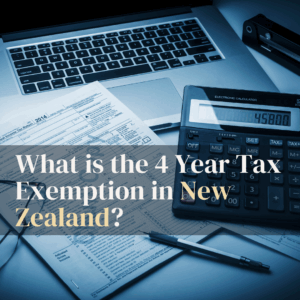4 year tax exemption in New Zealand is a key benefit offered to new residents, providing a unique opportunity for tax relief on foreign income.
This exemption is an important consideration for expats, investors, and individuals planning to move to New Zealand, especially for those with global financial interests.
If you are looking to invest as an expat or high-net-worth individual, which is what I specialize in, you can email me (hello@adamfayed.com) or WhatsApp (+44-7393-450-837).
This includes if you are looking for a free expat portfolio review service to optimize your investments and identify growth prospects.
Some facts might change from the time of writing. Nothing written here is financial, legal, tax, or any kind of individual advice or a solicitation to invest.
In this article, we will explore more about what the 4 year tax exemption in New Zealand is, how it works, who qualifies, and why it matters for new residents and global citizens.
We’ll also cover related aspects of New Zealand’s tax system to help you understand your obligations and opportunities as a tax resident.

Understanding the 4 Year Tax exemption in New Zealand

What is the 4 Year Tax Exemption in New Zealand?
The 4 year tax exemption in New Zealand is a special tax concession designed for individuals who become tax residents for the first time.
This rule allows eligible new residents to be temporarily exempt from paying New Zealand tax on most types of foreign-sourced income for the first four years of their tax residency.
In simple terms, if you qualify for this exemption, you won’t need to declare or pay tax on your overseas income—such as foreign investment income, rental income from overseas properties, or income from foreign trusts—during this four-year period.
This exemption can provide significant tax savings, especially for those with global assets or investments.
Who Qualifies for the 4 Year Tax Exemption in New Zealand?
To qualify for the 4 year exemption rule, you must:
- Become a New Zealand tax resident under the country’s tax residency rules
- Not have been a New Zealand tax resident at any time in the 10 years prior to becoming resident again
- Claim the exemption only once in your lifetime
It’s important to note that the exemption automatically starts from the date you become a tax resident. You don’t need to apply for it separately.
However, you’ll need to monitor when the exemption period ends to ensure compliance with New Zealand’s tax reporting obligations afterward.
How does the New Zealand tax exemption rule compare to other countries?
The 4 year exemption rule in New Zealand stands out internationally because it provides a clear, automatic tax exemption for most types of foreign-sourced income earned by new tax residents during their first four years of residency.
This approach is relatively generous compared to similar tax relief programs in other countries.
Some countries, like the UK and Australia, tax worldwide income immediately upon becoming tax resident, unless you qualify for special non-domicile or temporary resident statuses, which often require complex applications or ongoing compliance.
In contrast, the tax exemption in New Zealand is simpler because it applies automatically once you meet tax residency criteria, without needing to apply or opt in.
Countries such as Portugal (with its non-habitual resident regime) or Italy (with its flat-tax regime for new residents) also offer tax incentives, but these focus more on reduced tax rates or specific income types.
New Zealand’s exemption stands out by offering full exclusion of most foreign income for a fixed period.
Policy Intent Behind the NZ Tax Rule
The intent of the 4 year exemption rule is to attract skilled migrants, investors, and professionals who have global income sources.
By offering a tax holiday on foreign income, New Zealand makes it easier for high-net-worth individuals and internationally mobile professionals to relocate without facing immediate tax burdens on offshore earnings.
This approach encourages new residents to establish roots in New Zealand, invest locally, and contribute to the economy while gradually integrating into the tax system.
It also positions New Zealand competitively among countries seeking to attract global talent and capital.
What Foreign Income is Exempt from Tax in New Zealand?
Under the 4 year tax exemption in New Zealand, most types of foreign-sourced income earned by new tax residents are excluded from New Zealand tax for the duration of the exemption period.
Types of Foreign Income Covered Under the Exemption
The following types of income are generally exempt from New Zealand tax under the rule:
- Foreign dividends
- Interest from overseas bank accounts or investments
- Rental income from foreign properties
- Capital gains on overseas investments
- Distributions from foreign trusts or estates
- Income from overseas business activities
What Income Remains Taxable in New Zealand?
While the exemption covers most offshore earnings, certain income is still taxable even during the exemption period.
You will need to pay New Zealand tax on:
- Any income earned from work performed in New Zealand, even if paid by an overseas employer
- Income derived from services provided while physically present in New Zealand
- Income sourced directly from New Zealand investments or property
It is important to correctly distinguish between foreign-sourced and New Zealand-sourced income to avoid unexpected tax liabilities.
If you continue earning income from both overseas and local sources, keeping detailed records will help ensure compliance.
The exemption offers significant flexibility, but careful tax planning is key, especially for individuals with complex international income streams.
What is the Tax System in New Zealand?
New Zealand’s tax system is known for its simplicity and transparency, with no general capital gains tax, no inheritance tax, and no wealth tax.
Instead, the country relies primarily on income tax and a goods and services tax (GST) to generate revenue.
This straightforward approach makes New Zealand’s tax environment relatively easy to navigate compared to more complex systems in other countries.
Why New Zealand’s Tax Policy Appeals to New Migrants and Expats
The combination of a 4 year tax exemption in New Zealand and a clear tax framework is particularly attractive to new migrants, investors, and high-net-worth individuals.
New Zealand does not tax foreign income after the exemption period unless the income is remitted or derived from a New Zealand source.
For expats and global citizens, this policy offers:
- A predictable tax environment without hidden levies
- The ability to plan cross-border investments without immediate tax implications
- No punitive taxes on global wealth or estates
- Time to restructure global assets and investments without immediate New Zealand tax
- Tax-free receipt of most foreign income for four years
- Simplified financial transitions for new migrants establishing residency
Additionally, New Zealand’s network of double tax agreements helps minimize the risk of being taxed twice on the same income, providing further confidence for internationally mobile professionals.
These features contribute to New Zealand’s reputation as a desirable destination for those seeking both lifestyle and financial advantages.
What period does the tax year cover in New Zealand?
The tax period in New Zealand follows a standard annual cycle that runs from 1 April to 31 March of the following year.
This means the New Zealand tax year does not align with the calendar year, which can be an important consideration for new residents used to different tax reporting periods in their home countries.
Filing Deadlines and Tax Obligations for New Residents
For most individuals, the deadline to file an individual income tax return (IR3) is 7 July following the end of the tax year.
However, if you work with a registered tax agent, you may qualify for an extended filing deadline, typically until 31 March of the next year.
As a new resident benefiting from the 4 year tax exemption in New Zealand, you may not need to declare foreign-sourced income during the exemption period, but you are still required to report any New Zealand-sourced income.
It is advisable to register with Inland Revenue (IRD) early, obtain an IRD number, and confirm whether you need to file annual returns or if your tax is fully withheld through the PAYE system.
Understanding the tax year and filing deadlines ensures compliance and prevents penalties.
For expats and high-net-worth individuals with global income streams, aligning international reporting timelines with New Zealand’s tax year can also support smoother financial management.
How Long Do You Have to Pay Income Tax in NZ?
Once the 4 year tax exemption in New Zealand ends, you are subject to New Zealand’s standard tax rules on your worldwide income as a tax resident.
From the fifth year onward, you must declare and pay tax on all global income, including foreign dividends, rental income, and interest, even if the funds are not brought into New Zealand.
Ongoing Tax Obligations for Residents
As a tax resident of New Zealand, you will need to:
- File an annual tax return reporting both New Zealand and foreign-sourced income
- Pay tax at marginal rates that range from 10.5% to 39% depending on income level
- Keep accurate records of foreign income and claim foreign tax credits where applicable
Tax obligations continue for as long as you remain a tax resident.
Ceasing tax residency is required to stop paying tax on worldwide income.
Key Considerations for Expats and New Migrants
For expats and high-net-worth individuals, the 4 year tax exemption in New Zealand offers valuable financial advantages — but it also comes with important considerations.
Risks and Planning Strategies
- After four years, worldwide income becomes taxable, potentially increasing tax obligations
- Lack of preparation can lead to unexpected tax liabilities once the exemption ends
- Complex offshore structures may still require reporting under international tax transparency rules
Conclusion
While the 4 year tax exemption in New Zealand provides significant benefits, it also requires proactive planning to avoid surprises once the exemption period ends.
If you are considering a move to New Zealand or have recently become a tax resident, it is essential to seek professional tax advice tailored to your international financial situation.
By understanding the exemption’s opportunities and limitations, expats and global investors can make informed decisions to protect and grow their wealth.
Pained by financial indecision?

Adam is an internationally recognised author on financial matters with over 830million answer views on Quora, a widely sold book on Amazon, and a contributor on Forbes.



